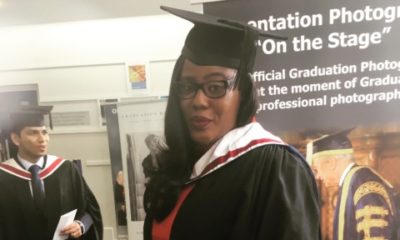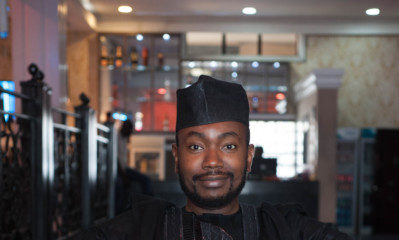Career
Move Back To Nigeria: Advising the Possession of Patience as a Virtue, Stephen Anebere Shares His Story
 Move Back to Nigeria is a series on BellaNaija which aims to encourage young and not-so-young professionals in the diaspora who are trying to make the decision of whether to move back to Nigeria. In collaboration with the brilliant team at MoveBackToNigeria.com, we hope to bring you a weekly interview with individuals who have successfully made the leap, considering the leap, as well as those who have tried it and realized it is not for them. MoveBacktoNigeria.com’s mission is to showcase stories of Nigerians abroad who have moved back home and are taking giant strides, often against all odds and to serve as inspiration to others. This, however, does not preclude us from sharing stories of the people who have moved back and are facing various challenges.
Move Back to Nigeria is a series on BellaNaija which aims to encourage young and not-so-young professionals in the diaspora who are trying to make the decision of whether to move back to Nigeria. In collaboration with the brilliant team at MoveBackToNigeria.com, we hope to bring you a weekly interview with individuals who have successfully made the leap, considering the leap, as well as those who have tried it and realized it is not for them. MoveBacktoNigeria.com’s mission is to showcase stories of Nigerians abroad who have moved back home and are taking giant strides, often against all odds and to serve as inspiration to others. This, however, does not preclude us from sharing stories of the people who have moved back and are facing various challenges.
This week we have the pleasure of profiling Stephen Anebere, a published author and Lawyer who recently moved back to Nigeria and is a passionate champion for the ‘move back’ cause. He shares his interesting and somewhat varied professional life and journey so far in his own words, so do read on and we hope you enjoy!
Thanks for speaking with us. Can you please introduce yourself and tell us who you are and what you do?
I am Stephen Anebere, a qualified Nigerian barrister. I currently work as the representative of the University of Sunderland in Nigeria and I also work in a part-time arrangement, as an Oil and Gas contract advisor to KDS & Co, a legal firm based in Lagos.
When did you originally leave Nigeria and why?
I left Nigeria mid 2007. I was 23 at the time, a few months out of Nigerian law school and was literally very impatient with life. I had also rounded up my NYSC with the Nigerian Gas Company (A subsidiary of NNPC). It was while with the Nigerian gas company that I nurtured the interest to major in oil and gas law, and wanted to do my Masters as quickly as I could, so I gained admission to study Petroleum law and Policy at Dundee University, Scotland UK.
Tell us about your educational background
I have an LL.B (honours) degree from Imo State University, Imo State and a B.L from the Nigerian Law School and was called to the Nigerian Bar in 2007. I have also a Master of laws degree in Petroleum law and Policy from the Centre of Energy, Mineral law and Policy- University of Dundee, Scotland UK.
And your professional background?
I would say my professional life began after my call to the Nigerian Bar. During my NYSC, I served as a Junior Lawyer at the legal department of the Nigerian Gas company, (A subsidiary of NNPC). It was an experience I really enjoyed and still see as a brilliant stepping stone that kick-started my career, as it was that environment that got me wanting to major in Oil and Gas.
Also, after my graduation from the University of Dundee, while staying back to gain some work experience before returning back home, I trained and worked as a part-time Citizen Advocate with Partners in Advocacy in Dundee, a non-governmental, Para-legal organization using non-instructive advocacy to fight for people with learning disabilities. I was with them for 19 months until I moved to London, where I couldn’t find any professional job. What was on offer were mostly non-professional jobs ranging from retail jobs to security to domestic jobs and so, I moved back to Nigeria in 2013.
3 months in, I got my current job as the Nigerian representative of Sunderland University in the North East of England, UK. I also advice a legal firm called KDS & Co on oil and gas contracts and arbitration, as well as giving professional legal advice in the same category on international arbitration cases, the recent being the dispute between Heritage Oil and Gas and the Ugandan Government at the International Court of Arbitration in London. I also find time to write, and have written two books, an Oil and Gas study book titled: The Dispute between Multinational Oil Companies and the Indigenous Peoples and the other a non- academic book about my personal experience as an international student in Britain, titled: The Other Side of Britain.
That sounds really impressive! And how did you feel, moving back home?
I knew I wasn’t going to stay away from home for a long time. I was sure of exactly what I wanted to do. I planned to return home as soon as I finished with my studies so as to utilize my skills gained abroad; but, on the other hand I also wanted to have some sort of professional experience before moving back home. However, the professional experience bit wasn’t really achieved and I moved back in 2013. Moving back wasn’t very easy, because I didn’t feel all that happy- it was mixed feelings of excitement and fear.
And how have you found the transition?
I grew up here and have had the most part of my adult life in Nigeria, so the transition wasn’t a big challenge. But obviously, when one has spent some years away from home, you will never find things the same way. Initially it was slightly difficult, I became a bit petrified and regretted the decision when things were not falling into place as quickly as I had thought. Eventually, I adjusted to the challenges and have now been able to fit right back into the system I originally belonged to. Apart from the obvious challenges of living and working in Nigeria, especially in Lagos, there are also a lot of benefits too – such as the proximity to family and friends. Furthermore, when it comes to business and entrepreneurship, I see the country still as an uncharted territory, there is a lot to do here. As long as you have a brilliant idea that people like, you can create wealth easily through it, although obviously, not every good idea will eventually be a money making idea.
Please tell us about your daily role.
Like I previously mentioned, I work as the Nigerian representative of the University of Sunderland in a contract arrangement with ESCC EDUCATION, which is an educational organization that provides free guidance and assistance to Nigerian students going to study abroad. The University of Sunderland is one of the great civic Universities in the North East of England. It has a long tradition of educating students from around the world and has been doing this for decades. Sunderland University is already popular in Nigeria for its strength in science and innovation, particularly in areas such as pharmacy, pharmaceutical sciences, environmental sciences, nursing and categorized MBAs, as well as their quality and affordability and their generous non merit-based scholarship scheme for international students. So I am basically in charge of in-country business development, marketing, recruitment and also visa counselling and appeals. Also I am on a part-time arrangement as a contract advisor in Oil and Gas contracts and dispute resolution with a legal firm.
You mentioned authoring a couple of books, can you discuss that in a bit more detail? As well as other projects?
My first book was published in 2010 by a German academic publishing company and is available on many online book shops including Amazon, and also on hard copy. The book discusses the difficult relationship between several indigenous peoples and multinational oil corporations engaging in trans-atlantic oil and gas exploration in different countries. It particularly uses a case study of two selected indigenous peoples in Nigeria and Peru to provide new ways of applying corporate social responsibility to bring a better relationship between the two.
On the other hand, the second book was published in Nigeria. A few months into my current job, through my daily business conversations with different Nigerian graduates, I came to realize that a lot of them still live in a world of cynicism and excessive skepticism about the other corners of the world, so I decided to put down a real life account of things through my own personal experience abroad. The book was published in 2013 and titled: The Other Side of Britain. Apart from discussing life in Britain as an African-International student, the book basically gives an account of day to day realities, to serve as a preparation guide for students wanting to study abroad, as well as touching on those questions bothering foreign Nigerian graduates who are looking forward to returning home after graduation.
Yes, I have a lot other personal projects coming up. I am currently putting down notes for my 3rd book and I am also working with a few friends, who are lawyers, to start up a non-governmental organization, giving free legal aid in the areas of human rights violation and domestic violence.
It all sounds impressive. But now you’re back home, are there particular challenges you have faced that made transitioning difficult for you? If yes, how have you been able to manage the challenges?
I can’t specifically mention any challenge that has been too difficult for me, but that is not to say that I haven’t had challenges since I moved home. No matter how difficult the challenge is here, I try to mitigate them because I believe that to be successful, I need to constantly overcome life’s challenges. Success has a price and we need to find out what those are and start paying them to be able to achieve success. I could say that finding a good job after returning home was a difficult challenge. Apart from this, whatever comes my way daily here in Nigeria, I take as part of living and the normal things we must face if we are going to grow up.
And on the whole, where do you see yourself in the mid to long term?
I see myself becoming a business consultant or an ambassador at some point in the future. I want to be able to solve business or diplomatic problems, make a change, or bring hope to hopeless situations. I am also looking forward to having my own legal or consulting firm and being able to stand on my own and also become an employer of labour.
On a final note, do you have any words or handy tips to note, for people who might be considering a move back to Nigeria?
Although my philosophy may be different in this regard, I think it is a big challenge to move back home after years abroad and this is indisputable. My advice is, anyone wanting to move back home must take out time to decide exactly what they are coming to do – i.e to find a job or to start a business. In either of these categories, they would need determination and passion, focus and drive as well as will and skill-(and I think the will should be greater than the skill).
Apart from these, one virtue anyone who is moving back to Nigeria must possess is patience because it can take some time before things start to fall into place. If anyone is coming back to look for a job, then they must know that it is hard to find jobs in Nigeria and this might take a while. I should add that despite the fact that finding a good job can be difficult, to say there are no jobs is completely misleading. The number of jobs versus the number of applicants chasing such jobs is where the problem lies. Sometimes, young people may be waiting for their family or friends to hand them something to do and this shouldn’t be the case. Besides, Nigerian employers are not always big fans of foreign degrees. I often come in contact with new returnees who are looking for jobs and most of the time, they erroneously feel that they have the right to earn X-amount of money because they have a foreign qualification or because they went to school abroad. A degree only indicates that one has the ability to learn, it is the practice part that makes one successful, so if they really want to stay back and work in Nigeria, then, they should be able to set their minds right to accept any reasonable salary that comes their way, to start from somewhere and work themselves to the top.
Many thanks for your time and best wishes moving forward.
______________________________________________________________________________________________________
The primary objective of MoveBackToNigeria.com is to connect Nigerian professionals with various opportunities in Nigeria, ranging from recruitment drives to information & support regarding relocation processes, financial & tax advice and much more. Move Back To Nigeria also features social interest topics such as what’s on, where to live, how-to survival tips and so on. Consistently engaging with and featuring Nigerian professionals in weekly interviews, Move Back To Nigeria regularly publishes social interest articles relevant to the general public. Everyone is welcome to their online discussions & fora and you are invited to air your views & suggestions on the topical and trending matters section. For more information and further inquiries, please contact [email protected].
























